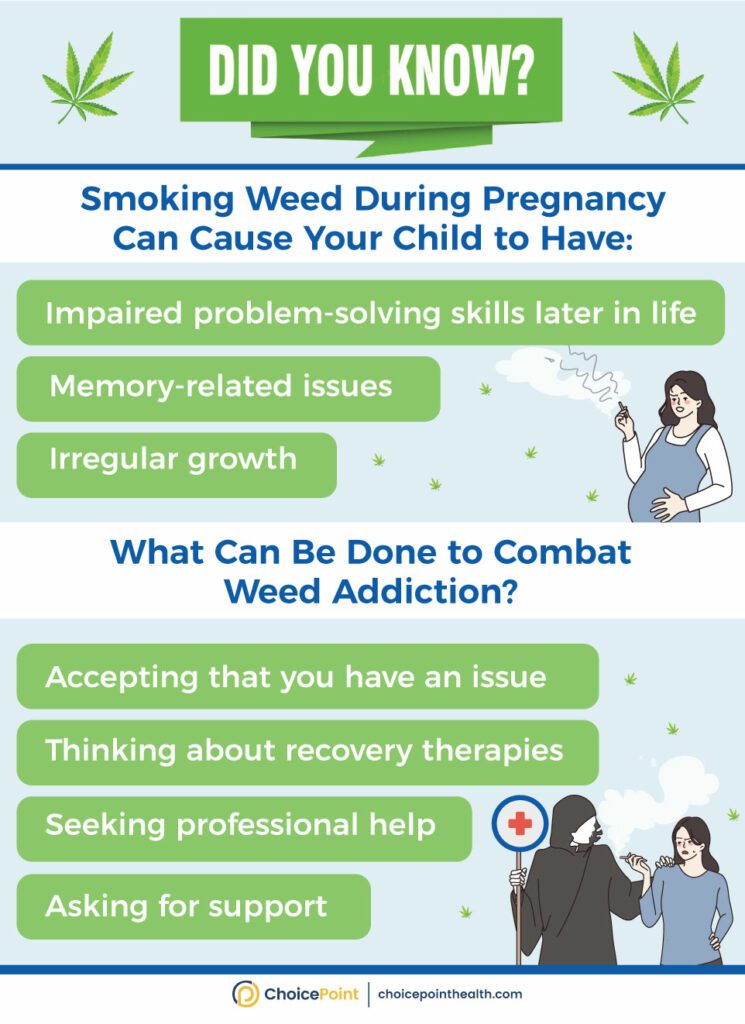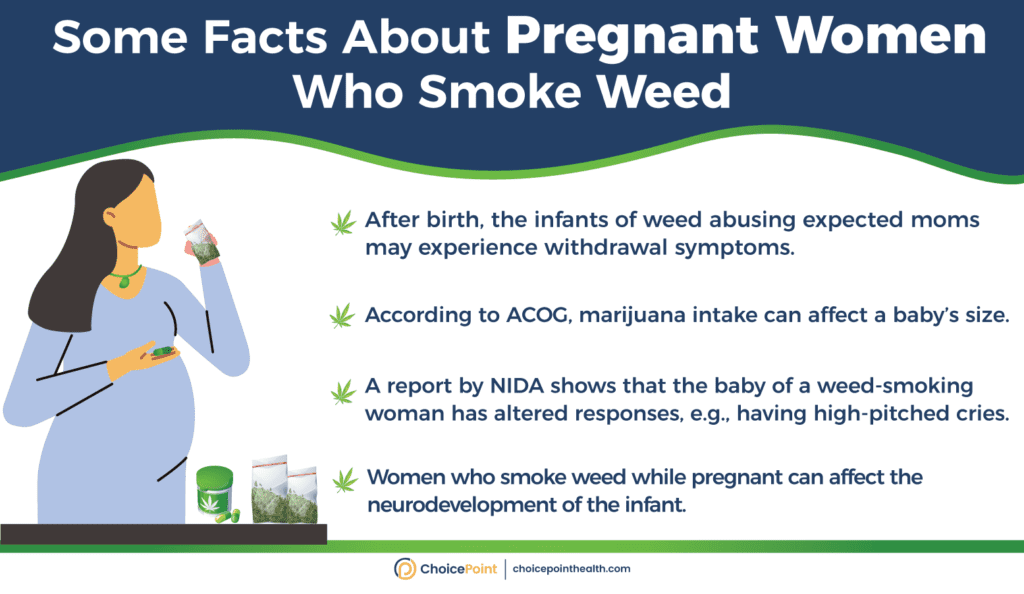Survey reports show that 1 in 10 individuals who smoke weed, otherwise known as marijuana, can become addicted to weed. Approximately 5% of women take one or more addictive substances while pregnant. 1 in every 20 pregnant women in the US uses drugs like cocaine, heroin, and marijuana. The struggle to deal with marijuana use disorder while pregnant is a fight not easily won without support. Keep reading the article if you want answers on how and when to stop smoking weed while pregnant to help yourself and your baby from any long-term effects.
Table of Contents
Risks of Smoking Weed while Pregnant: Here’s Why It Should Be Avoided
Marijuana contains almost 500 chemicals, including tetrahydrocannabinol (THC), that can lead to abnormal fetal neurological development. THC can potentially cross the placenta and affect the baby, especially the brain. Sometimes, marijuana is used as a treatment for morning sickness, but it is dangerous to you and your child without your doctor’s approval. Most of the research studies suggest that weed may have the following effects on a pregnant woman:
1. Stillbirth
This is the condition where a baby dies in the womb.
2. Lower Birth Weight
If a mother smokes weed, her baby might have a lower birth weight, meaning they have not gained the weight they should have in the womb. This condition is also known as “fetal growth restriction,” It can also hinder the normal growth of the baby’s body or head.
3. Premature Birth
Premature birth is the birth of a baby before 37 weeks.
4. Anencephaly
This condition disables normal development of the fetus’ skull and spine. Most babies miss a significant part of it, resulting in death. Marijuana increases the risk of anencephaly.
5. Increased Cravings
The likelihood of indulging in other smoking and drinking habits for people smoking marijuana increases.
Most women shy away from seeking help due to the stigma attached. However, a loved one should not be abandoned because smoking marijuana daily while pregnant is dangerous for the mother and the unborn child. Therefore, birth defects from smoking weed while pregnant must be considered. Therefore, a must-read what top gynecologists had to say about the side effects of cannabis use on pregnancy.

Weed Use During Pregnancy
Marijuana and Pregnancy
According to ACOG, smoking weed while pregnant is not advised, as the compounds in marijuana tend to enter the placenta, crossing the barrier. Doctors recommend you quit smoking weed three months before you try to conceive. Ideally, you must quit smoking weed instantly upon knowing you are pregnant, as it tends to stay in your system. Babies are far more sensitive to the impacts of chemicals and pollutants than adults.
Suppose you or someone you know struggles to quit smoking weed while pregnant. In that case, ChoicePoint aims to offer support to expecting mothers struggling with addiction in the comfort of their homes by providing a personalized expecting mothers addiction treatment program which can be accessed virtually, or you can also visit our addiction treatment facility in Fairlawn, NJ, and Great Falls, Montana. Contact us at 844.445.2563 to seek professional help from our DEA-certified doctors.
When to Stop Smoking Weed while Pregnant: What Are the Potential Options?
Most people hooked on weed, and other addictive substances find it challenging to quit smoking. In the case of a pregnant woman, it becomes even more hazardous as the baby is involved. Commitment plays a significant role in quitting marijuana, but it may not be easy to adhere to it without support. Therefore, the most effective way to combat weed addiction as a pregnant mother is to opt for addiction treatment. ChoicePoint’s addiction programs may assist you in getting rid of smoking weed while pregnant.
The following treatments may prove to be effective for you or your loved ones who are trying to eradicate weed:
1. Marijuana Detox Program
In this treatment, all the toxins and harmful chemicals are eliminated from a patient’s body. This procedure is called detoxification, hence the word detox program. For pregnant women, it is essential to get marijuana out of their systems so that the fetus is not traumatized. Therefore, options for a marijuana detox program may prove to be helpful. A detox program may reduce withdrawal effects and minimize recurrent urges. Read this article to learn about Do’s and Don’t during detox while pregnant.
At ChoicePoint, we have a handful of options to support a mother’s health, the detox program being one of them. The Detox program for pregnant women is specifically designed to ensure the safety of both the mother and the child. Contact us at 844.445.2563 or fill out this form to protect yourself and your baby from drug addiction.
2. Medication-Assisted Program (MAT)
The medication-assisted program employs FDA-approved medication to help pregnant women suffering from marijuana abuse. The doctors prescribe efficacious medication after a checkup that may also help with withdrawal symptoms and drug cravings in general.
Explore ChoicePoint’s MAT program here.
3. Marijuana Rehab
Persistent weed smoking can have adverse effects on your physiological, emotional, as well as psychological well-being. Though other treatment options may prove viable for some, the chances of relapsing are always high. Therefore, some people might need constant support from medical professionals. For this purpose, you may want to join a marijuana rehab. Sometimes, it is not convenient for pregnant women to visit in person. So, you can opt for virtual rehab at ChoicePoint.
4. Intensive Outpatient (IOP)/ Outpatient (OP)
To determine when to quit weed when pregnant, it is best to seek help from professionals who can put forth all the options for you and guide you accordingly. In an OP session, you receive personalized treatments that address all your needs. Usually, the treatment that assists in gaining permanent sobriety is OP, tailored to individual needs.

Get the Facts about Marijuana Use during Pregnancy
When to Stop Smoking Weed While Pregnant – Top Concerning Questions
Find out the answers the most concerned mothers are looking for;
a) Can Smoking Weed while Pregnant Cause Birth Defects?
Smoking weed while pregnant can affect your child’s neurological and physiological health. Therefore, all the critical health organizations have a consensus to refrain from smoking weed when pregnant, as no research shows the efficacy of marijuana for maternal health issues.
Marijuana is the most commonly taken illicit drug in the US. It is pretty easily accessible to teenagers. If you are showing symptoms of addiction, take our weed addiction quiz to determine if you need help.
b) Can Smoking Weed while Pregnant Cause a Miscarriage?
Although research studies in animals suggest that weed can lead to miscarriages, no cases in humans have been observed. According to NIDA, smoking weed when pregnant can lead to other problems later in life, such as hyperactivity disorder. As for miscarriages, no study shows the role of weed in miscarriages.
C) Can Smoking Weed while Pregnant Cause Seizures?
One of the side effects of smoking weed while pregnant is that it can result in seizures. A misconception surrounding synthetic weed is that it is not as dangerous as it appears. On the contrary, it has proven more hazardous for the fetus and the mother. Seizures can cause separation between the placenta and the uterine wall, resulting in a significant hemorrhage.
When to Stop Smoking Weed While Pregnant: ChoicePoint’s Bottomline
Smoking weed while pregnant increases the risk of stillbirth by 2.3 times. Marijuana addiction is a constant struggle and is even more concerning if you are pregnant. Contact us if you are wondering when to stop smoking weed while pregnant. At ChoicePoint, we believe in providing support to those who need it. With the help of your commitment and the support of our doctors, you can protect yourself and your baby from harm.
Medical Disclaimer:
ChoicePoint aims to improve the quality of life for people struggling with substance use disorder and mental health issues. Our team of licensed medical professionals research, edit and review the content before publishing. However, this information is not intended to be a substitute for professional medical advice, diagnosis, or treatment. For medical advice please consult your physicians or ChoicePoint's qualified staff.










Review When to Stop Smoking Weed While Pregnant – Better Late Than Never.